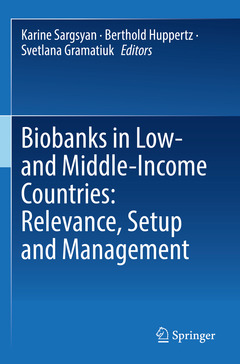Biobanks in Low- and Middle-Income Countries: Relevance, Setup and Management, 1st ed. 2022
Coordonnateurs : Sargsyan Karine, Huppertz Berthold, Gramatiuk Svetlana

The book addresses life science and business professionals as well as national authorities who are interested in biobanking in general and in setting up a biobank in particular.
Prof. h. c. Karine Sargsyan, MD was born in Armenia and lives in Graz. She is Managing Director for International Biobanking and Education at the Medical University of Graz and Vice Scientific Leader and Lecturer of the course M.Sc. Biobanking and of Human Centred Artificial Intelligence in Medicine at Medical University of Graz. Due to her professional experience, she is a leading member of many scientific organisations such as the ISBER (International Society for Biological and Environmental Repositories), the ESBB (European, Middle Eastern & African Society for Biopreservation and Biobanking), etc. She provides scientific expertise and experience as a consultant/advisory board member to several institutional organisations (BBMRI.pl, Oncology Research Vietnam, Qatar Biobank, DLR, Ministry of Health of Armenia, NMRRC Russia, etc.). She is a Visiting Professor of Medical Genetics at Yerevan State Medical University, where she also completed her MD in paediatrics. In her free time, she enjoys painting (three exhibitions), playing the piano and happily commits herself to various voluntary activities.
Prof. Dr. Berthold Huppertz is a German biologist with more than 25 years experience in the medical field. Berthold is chair of a preclinical division as well as Head of the Master course in Biobanking at Medical University of Graz, Austria. For seven years he was Director of Biobank Graz, the largest clinical biobank in Europe. Berthold has published more than 230 scientific papers in peer-reviewed journals as well as more than 40 book chapters in scientific and teaching books. With his biological, medical and biobanking background, he loved to work on this book.
Dr. Gramatiuk Svetlana, MD, PhD, is a graduate of the National Medical University of Kharkiv. She studied Biobanking at the Medical University of Graz, Austria, and Infectious Diseases Medicine and Virology, Microbiology and Allergology at the Nationa
Provides an overview of theory and practice of biobanking
Explores the cornerstones of successful biobank implementation
Documents the development and progress of Ukraine's Biobank Network
Date de parution : 03-2023
Ouvrage de 235 p.
15.5x23.5 cm
Date de parution : 03-2022
Ouvrage de 235 p.
15.5x23.5 cm
